

The glorious coronation of Lisa Stanger as Survivor NZ: Thailand's winner took place well over a month ago now, so this piece is... not particularly timely. Why did this finale recap take so long to write? Mainly, the seamless transition from the Survivor NZ: Thailand finale to the premiere of Survivor AU: Champions v. Contenders that same week made it impossible to finish off NZ while also staying on top of AU. The Survivor wheels churned onward. Precious little time to process the end of one season, now on to the next! Never mind that Survivor SA: Philippines was also airing, only a few weeks behind Survivor NZ. And now here we are weeks later, with Survivor AU just now hitting its merge, while pre-season U.S. Survivor: David vs. Goliath coverage kicks into high gear.
On the one hand, it's a challenge for a Survivor fan site publisher to try to keep up with it all. On the other hand, as a Survivor viewer who loves the game enough to reach outside the traditional CBS boundaries—outside even CBS All Access, with its library of every American season—it's a bonanza of opportunity. There is no longer an offseason. Eighteen years after Borneo premiered on CBS, this is the best time ever to be a Survivor fan.
That's true even considering the recent rut of underwhelming US Survivor seasons (Game Changers through Ghost Island, at least, and who knows how bad S37-38 could be). Regardless of how the American version fares, we are smack in the middle of a golden age of International Survivor. Survivor NZ's Thailand season was a dramatic step forward in the evolution of Survivor NZ, with its increased budget and production values clearly showing. At the same time, the South African Survivor: Philippines season has also been highly praised, and Australian Survivor has followed up its universally beloved 2017 season with what has thus far been another highly watchable 50 (plus) day extravaganza in Champions v. Contenders. Even despite including Russell Hantz!
So while diehard American Survivor fans frequently bemoan the current state of the US game, or having to endure the long offseason, there's no better time to take a more global perspective, because the game is clearly alive and well in these non-US editions. Such as, for example, the one you probably came here to read about in the first place: the now-complete Survivor NZ: Thailand.
A successful Final Tribal caps a success-filled season
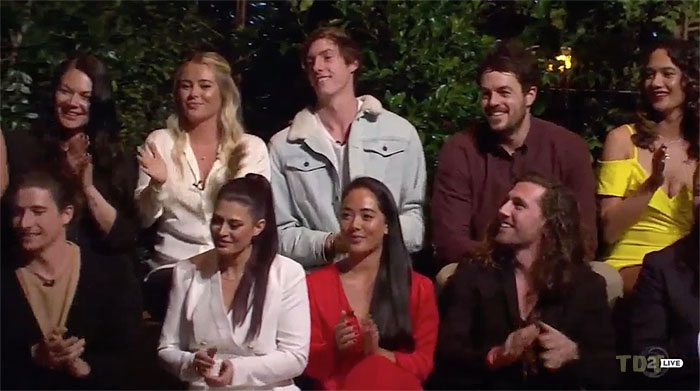
One of the joys of international Survivor is that, like the US version, the other franchises (whether by choice or due to budget restraints or network demands) often tweak things, trying out new twists, or trying new formats (like the Outpost). Survivor NZ: Thailand did this here by breaking the finale up into two parts: Episode 14 showed the winnowing of the field down to the final three (and offered a peek into the Jury Villa as Matt approached Adam and spilled about his formerly secret connection with Dave). As a cliffhanger, it ended with Lisa, Tess, and Dave arriving at the Final Tribal Council. Episode 15 jumped in at the start of that Tribal, showed the jury grilling the finalists, moved to the vote reveal, then on to a full, game-spanning reunion Q&A, in which Matt Chisholm took to grilling everyone.
As the centerpiece of the finale, the final Tribal discussion was much better than the previews hinted it would be. If the jury indulged in over-the-top berating of Dave, the editors at least had the good sense to tone it down enough to make everyone appear relatively civil, which was a relief. Again, it wasn't Dave's (or Matt's) fault that they were on this season together, it was the show's, and it didn't seem particularly fair for the show to be mining its own self-inflicted mistake for drama and cheap conflict, all at the players' expense.
Most importantly, though, all three finalists gave strong arguments for why they should win. Tess earned her jury votes by making a compelling case for herself. Lisa, as expected, gave a strong summation of her game, and added just enough personal touches ("I have a pre-game alliance... with my family") to seal the deal. Despite being caught off-guard by the jury already knowing about his and Matt's friendship, Dave was still able to recover, flash his idol, and explain his game as well. Dave was convincing enough that he should have had at least one vote, but no luck there. (And since Dave's votes probably would have cut into Lisa's total, maybe that's for the best.)
This season had a much stronger assortment of fierce competitors than the first, and from Matt Chisholm's opening greetings, the show explicitly embraced and encouraged aggressive, strategy-oriented gameplay. In that context, perhaps it's not surprising than in the end, the strategic mastermind ended up winning the jury vote. Still, it came perilously close to the exact opposite outcome: rejecting the entire concept of strategic gameplay in favor of annointing "I won the two challenges I had to" as a quarter-million dollar-winning strategy. Ironically, to get to that final total it did, Lisa's win probably required Tara to fall on her sword and allow herself to be voted out (which the show didn't seem terribly thrilled about), to cast that winning vote. Especially considering Matt had to vote for someone other than his high-school friend, and Arun and Eve had to vote against the guy who was probably their closest ally since Day 1. Many things had to break exactly the right way to achieve the outcome we saw, but in the end, we're glad they did.
Lisa: The Cirie who won!
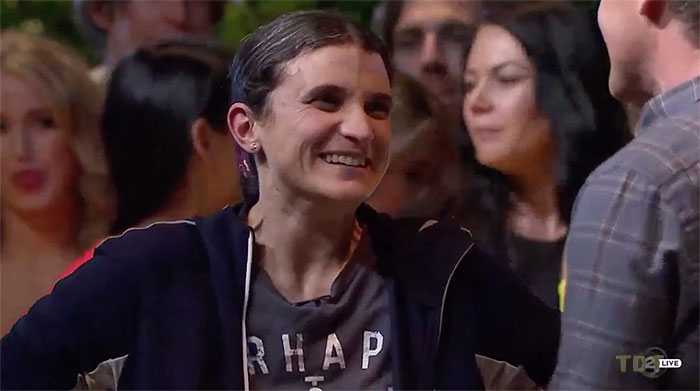
Lisa's victory was a razor-thin, nail-biting 4-3-0 finish, but in the end, just like Yul Kwon and Tina Wesson, Lisa pulled off the one-vote victory. Just enough of the Thailand jurors respected her strategic gameplay to reward her with the quarter million, and for that, we're thankful. Because Lisa's win truly felt like a win for all fans, framed as the season was in the first episode (according to our recap title, even) as a battle between superfans (Lisa) and people completely naïve about Survivor (Tess).
Lisa is the rare superfan winner who came across as a regular person that just happened to also be a huge Survivor fan. Whereas Cochran was a gifted narrator who also happened to be a Harvard Law student, or Adam Klein was super-intelligent Stanford grad with a heartbreaking backstory, Lisa came across as an ordinary person: a nice, quiet, school librarian, and a mum. Who also happened to be a Survivor superfan, a podcast listener, an RHAP patron. Chances are, if you're reading this, you're probably one, too. Like Cirie Fields, Lisa represented those of us who just want to get off the couch and play.
That's not to say Lisa was winging it. She had a complete strategy planned out before she played, one that she articulated well, but it wasn't some complex formula of blindsides and vote splits. It was simply to be herself, but slightly moreso. As she announced in her pre-game interviews, her intention was deceptively simple: to avoid the normal unease superfans tend to generate among their tribemates, simply by leaning into her super (-duper-) fan status. By playing up her excitement about and interest in the show as harmless fangirling, she seemed less threatening.
And as a contestant on TV, she also also came across as highly relatable, in part because hers wasn't a smooth sailing, perfect game (like, say, Cochran in Caramoan). She struggled at times, whether it was missing her family after seeing videos from home, or having a crisis of confidence after coming up with an epic blindside plan to take out Matt, only to see him both grab the idol she also found, and win regular immunity. She also stumbled a bit with her post-Outpost lie about her extra vote advantage, a cover story that J.T. immediately picked apart. Through it all, though, Lisa mapped out her moves coherently in her confessionals, which really helped keep her game accessible to the audience. Lisa's journey seemed like one every fan might hope theirs would resemble.
Then Lisa capped it off by achieving the highly unlikely: Pulling off a 3-2-1 blindside of Matt, her closest ally, then in the final vote, defeating two players who were much younger than her, while also facing a jury full of younger voters. At 38, she was pushing up against jury biases against older players in general, and older women (and mothers) in particular. Among female Survivor winners, only Tina Wesson (39) and Denise Stapley (41) have been older than Lisa (and Denise faced off against two finalists older than she was). The degree of difficulty in all this made Lisa's success that much more thrilling to watch. A great finish to a solid season.
The numbers on Lisa's social game: Dave said it best in his RHAP interview: "Everyone thought that they were best friends with Lisa." That's a solid indicator of Lisa's social game prowess. But as luck would have it, we do have an actual statistic we can turn to that measures this: Performance Above Expectation (PAE). That's a metric that takes a finalist's in-game performance and compares it to their jury votes received (relative to the other 1-2 finalists). Here, Lisa came away with a 26.6% PAE, which puts her social game among the top 20 all-time, at least for people who made the finals, just below the aforementioned Yul Kwon. (By comparison, Tess is at +2.1%, while poor Dave has a -28.7% mark.) So congratulations also to Lisa for that.
Side note: Rob has a vicarious victory? Maybe it's the RHAP shirt talking, but can Lisa's win be viewed as a projection for what might have happened in The Amazon, if S6 had been the season where Survivor switched to a Final Three format? Lisa's game was pretty similar to Rob's (Alex was Rob's Matt Hancock), Dave is strong in challenges like Matt von Ertfelda (except that Dave had a secret friend on the cast, instead of a general vibe of creepiness), and Tess is a pretty close analogue of Jenna, replete with pulling off a couple of surprising, last-minute immunity wins to secure her spot in the finals. Like Tess, Jenna had many loyal friends on the jury, and probably could count on at least Heidi's vote, and possibly Dave (Johnson) and Alex's as well, even against Rob. Rob probably would have had Deena and Christy, and might have had a shot at Butch's vote. (Still, The Amazon would need an additional juror with an F3, and who knows how Roger would have voted.) Regardless, it's great that an RHAP patron won, finally. A victory for someone wearing Rob's t-shirt, 15 years later, is still sort of a victory for Rob, right?
Tess's almost-win
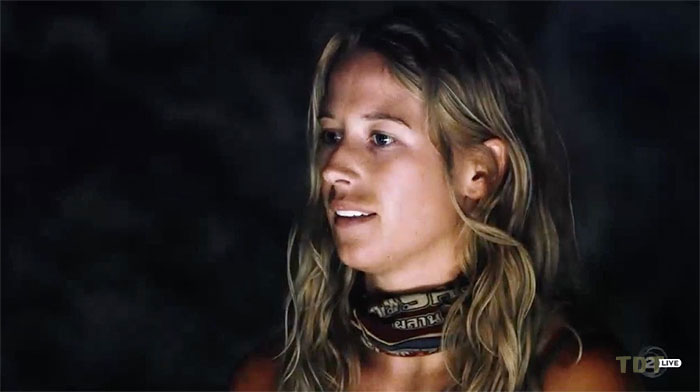
Despite the fact that she rarely voted correctly (just three times in nine Tribals) and made it to the finals without any allies, Tess did a lot of things right this season: She came across as a positive, straightforward person. She formed really tight bonds with people like Adam, Brad, and Renee. Had Josh made the jury instead of Arun, Tess is probably your Season 2 champion. Given that she fought so hard in the final challenge that she incurred nerve damage in her hand, she also deserves respect for not rolling over and giving up after Adam was voted out.
So why were so many superfans actively worried about her winning? There were probably two main reasons why Tess wasn't more popular with superfans: (1) she gave voice to the dreaded "I played an honest game" claim, which is never actually true, and (2) the editors depicted her as Lisa's foil from Episode 1, and Lisa was, understandably (as a known RHAP patron from the beginning, and as an increasingly impressive strategist as the game progressed) extremely popular with superfans. And, obviously, there can only be one winner. Tess certainly had her moments, and occasionally achieved peak Keith Nale-esque oblivious entertainment ("mattresses"), but in general, it's really hard for a non-fan to become a superfan favorite.
Popularity aside, though, Tess did misplay in a few areas, as might be expected for someone whose first exposure to Survivor came while they were playing. Primarily, where Tess went wrong was in not doing more to befriend the people on the bottom of the power structure. In post-swap Khang Khaw, she seemed content just to never talk to Eve. She bought Adam's lie that Arun was a horrible person, made no visible attempt to cross-check Arun's story, and declined to work with any Chanis (apart from Renee, who had abandoned them as soon as possible) post-merge. She likewise maintained her Invisible Five loyalty by continuing to not work with Dave until she and Adam were absolutely desperate, and Dave was the obvious swing vote at final five.
It was indeed impressive that, mostly through sheer force of will, Tess successfully thwarted the dominant alliance's plans, and went all the way from a possible F5 boot to being the second-place finalist. But that comes with a big caveat: she lasted as long as she did in part because her lack of strategic gameplay (and loyalty to her original alliance above all else) made her one of the least threatening players out there. Simply put, Arun and Brad and Renee and Eve and Matt were all picked off before her because they seemed like bigger threats.
That's not to say Tess couldn't improve if she played again, though. (Although obviously, it's pretty difficult to improve on being one vote short of the win.) Nor should she automatically be dismissed as a returnee. Tess gave entertaining confessionals, the social bonds she made were clearly quite strong, and she was proved she can win challenges. With just a few key moves here and there, and a few small tweaks to her social game, and Tess could easily become a winner the next time she plays. After all, if she played again, nobody would expect Tess to be making Big Moves.
Dave's valiant attempt
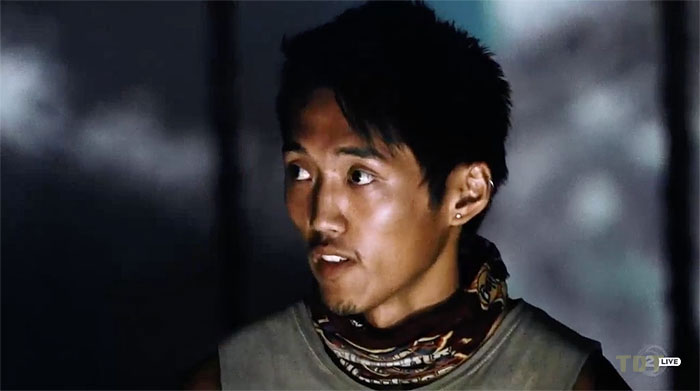
Even though Adam couldn't be bothered to even pretend he gave a shit about what Dave was saying, Dave also made solid arguments for why the jurors should vote for him. Sadly though, none did. Of course, had Dave pried even one vote away from Lisa (none of Tess voters seemed remotely flippable), the outcome of the season changes. Maybe a 3-3-1 tie still produces the same victory, with Dave casting the deciding vote for Lisa. But had Matt and Dave not actually been high school friends, or had Matt not spilled their secret at the Jury Villa, maybe Dave and Lisa would have evenly divided the erstwhile Lisa voters, and inadvertently handed Tess a 3-2-2 win.
Still, it's always disappointing to see a solid finalist join the Zero Vote Club (like, for example, Lisa's hero, Stephen Fishbach). Dave deserved better than that fate, especially since playing Survivor with Matt was not his fault, and didn't even help him all that much.
A Survivor fan's wish list for Season 3
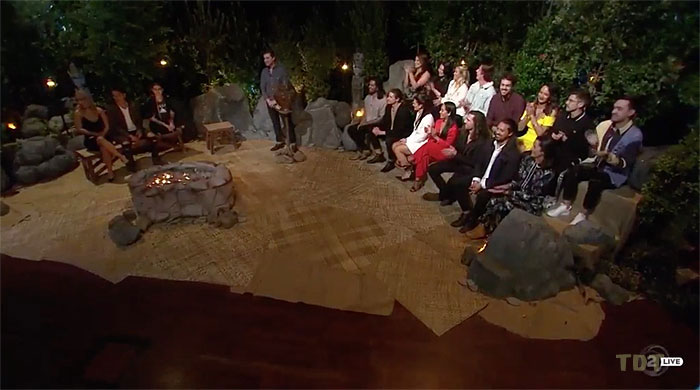
First off, the #1 wish for Season 3 of Survivor NZ would be simply that there is one. The day after the finale, the depressing news of its poor ratings came out, along with the implicit threat that Survivor NZ may be done. Which would be a tremendous loss, because Thailand was such an entertaining and compelling season in and of itself, as well as such a dramatic improvement over the first season, Nicaragua. Thailand featured great challenge selection, an inspired pre-merge twist with the Outpost, and just enough idols and advantages to keep things interesting. To be honest, very little needs to be changed.
Even so, there must be some small chance that the show will continue, and if it does, here is a short list of improvements that could make the show even better.
- A simple casting request: Obviously, don't let the Matt/Dave thing happen again. It was interesting for a bit, because what seemed like an obvious advantage really didn't seem to be as advantageous as it should. Then it clearly became a point of contention with the jury, one that completely derailed Dave's chances of winning. It wasn't fair that it helped them, and it also wasn't fair that it hurt them. It shouldn't be *that* hard to cross check sufficiently to at least not put high school/ college classmates on the same season.
- Put a lid on the pre-game chatter: Last season, it was clear everyone had talked extensively in the pre-season, which is just not done in the American version. Here, everyone already knew each other's names after the opening challenge, when tribes were picked, suggesting that was again the case. Maybe that made more sense this time, given that Kaysha and Franky were known to everyone before playing. On the other hand, from Dave's RHAP interview, it sounds like people were even able to text each other before playing, and set up pre-game alliances? That's... excessively lax. Returning player seasons and pre-game alliances are an unavoidable problem with returning player seasons, but for newbies, it's vastly preferable when the players' first real, organic impressions from talking to each other to be captured on camera, and not off-screen during the lead-up to filming. It's not that difficult to make this a rule. Just tell the contestants you'll replace them with alternates if they talk to each other.
- Put a lid on the pre-jury post-game chatter: That's not nearly as important as making every attempt to preserve the suspense of the season for the viewers. Survivor NZ's efforts here seemed... minimal? First off, the pre-jurors are apparently sent home as they're booted. That's fine when they're relatively anonymous. But again, this season included two players (Kaysha and Franky, who won public casting competitions) who were known to the public before filming started. So when they're busy Instagramming before filming ends, that sort of ruins the suspense with respect to how they fared. (To be fair, Russell Hantz did the same thing during Survivor AU, which given his history of spoiling the show, should surprise nobody.) We get it, Survivor NZ doesn't have a US-sized budget, and can't afford to keep the pre-jurors off the grid by sending them off on a month-long vacation during the jury phase. But at least you could tell them not to use social media during filming, no? Maybe threaten them with reduced screen time/ winnings if they violate that rule. This just seems like basic contestant wrangling.
- Ban plastic! The "reward" Ziploc bag full of melted chocolate was thankfully a distant Nicaragua-n memory. But Eve's idol still came wrapped in another plastic bag. (Yes, it was underwater, but you can just hand the paperwork over to the idol finder off-camera, it doesn't need to be in a waterproof container.) Additional plastic items popped up from time to time, which were probably intended simply to look colorful, but just ended up looking cheap. For example: the containers for the Day 39 breakfast. Similarly, in challenges, US Survivor's art department goes the extra mile to make everything look old/ weathered. Keys are antique-looking chunks of rusty metal, not shiny stainless steel. Ropes are thick, scratchy-looking hempen cords, not blindingly white, skinny nylon strings. It's a style thing, really, but it matters more than you'd think in the overall feel of the show.
- It's time to vote: For the love of all things holy, please use a Sharpie for voting, not whatever crayon/ colored pencil/ charcoal thing you used this time. It smudged, it bled, it looked like a preschool art project in progress. (But bravo for at least having the ballots folded the correct way this season.) Once again, a petty, style-based complaint. But it's a good thing we're focusing on something so minor, right? Just about everything else was really good!
In retrospect, this was a really fun, well-executed season of Survivor. Having fourteen 90-minute episodes to cover Days 1-39 provided just the right amount of character depth (except perhaps for poor Tara), the NZ-created Outpost twist was a triumphant addition to the Survivor game mechanic archives, and the show seemed to find exactly the correct ratios of action to strategy to narrative.
We don't know what the future holds for Survivor NZ, but let's hope the show has the chance to build off of this success. In the meantime, give Survivor SA: Philippines and/or Survivor AU: Champions v. Contenders a look as well, while you're waiting for David vs. Goliath. There's no time like the present.
 Jeff Pitman is a New Zealand expat, is the founder of the True Dork Times, and probably should find better things to write about than Survivor. So far he hasn't, though. He's also responsible for the Survivometer, calendar, boxscores, and contestant pages, so if you want to complain about those, you can do so on twitter: @truedorktimes
Jeff Pitman is a New Zealand expat, is the founder of the True Dork Times, and probably should find better things to write about than Survivor. So far he hasn't, though. He's also responsible for the Survivometer, calendar, boxscores, and contestant pages, so if you want to complain about those, you can do so on twitter: @truedorktimes
Other NZ: Thailand Episode 15 (finale) recaps and analysis
- Luke Harries at The Spinoff: "Survivor live finale recap: We have a winner"
- Kemper Boyd at PurpleRockPodcast.com: "Finale recap"
- Chuck Cunningham at InsideSurvivor.com: "Tick!"
Exit interviews - Lisa Stanger (winner)
- NZ Herald (7/30/18): "Survivor NZ winner Lisa Stanger's secret weapon"
- Kate Robertson at Stuff.co.nz (7/30/18): "Years of Survivor research couldn't prepare Lisa Stanger for world's toughest game"
- Kyle Dessent & Bryan at 2 Boys Talk Survivor (7/29/18): "NZ: Thailand E15 Winner Interview"
- Shannon Gaitz at RHAP (8/5/18): "Thailand Deep Dives | Lisa Stanger"
Exit interviews - Tess Fahey (2nd place)
- None found.
Exit interviews - Dave Lipanovic (3rd place)
- Shannon Gaitz at RHAP (8/2/18): "Thailand Deep Dives | Dave Lipanovic"
- Kyle Dessent & Bryan at 2 Boys Talk Survivor (7/29/18): "NZ: Thailand E15 3rd Place Finalist Interview"
Podcasts
- Shannon Gaitz at RHAP: "Thailand Episode 15 Finale RHAPup | AK Knight"
- Estelle Clifford at TheHits.co.nz: "Survivor Radio - Episode 15"
ADVERTISEMENT